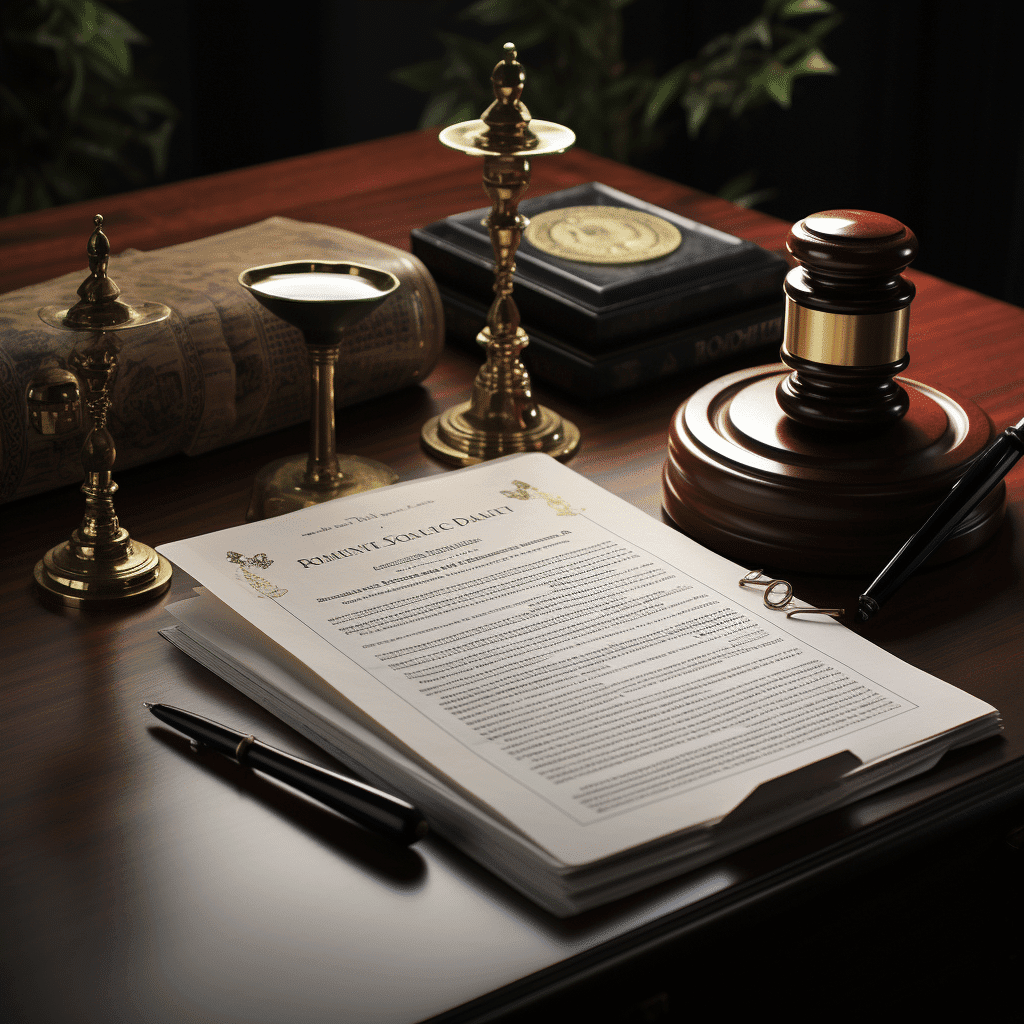Demystifying Trusts: Can You Set Up a Trust without an Attorney?
Well, here’s the mystery: Can you set up a trust without an attorney? Buckle up, folks, as we set off on this informative journey through the enigmatic corridors of trust and estate planning.
Understanding the Basics of a Trust
At its most fundamental, a trust is a legal entity holding property or assets for the benefit of specific individuals, usually termed as the beneficiaries. From “living trusts” to “family trusts” and everything in-between, there’s a universe of trusts out there that must make your head spin. But as you dig into the subject, it becomes clear that each serves a unique purpose, such as bypassing probate on death, tax savings, or controlling assets after death.
A trust can be mighty useful for several reasons. For instance, it can sidestep the costly and time-consuming probate process. It also offers greater control over property distribution after death, minimizes estate taxes, and ensures asset protection against lawsuits or creditors. Exciting stuff, right? But wait a minute! That burning question remains unanswered: do you need a lawyer to tiptoe through this trust setup maze?
Trust Terminology You Should Know
Before deciding whether to lawyer-up or not, let’s get comfortable with some trust jargon. Trust terminology, such as “trustor” (the person setting up the trust), “trustee” (the entity managing the trust), and “beneficiary” (the lucky ducky who benefits from the trust), form the basic vocabulary of trusts.
Once you familiarize yourself with these terms, you’re a step closer to cracking the code. Now, we’re treading into more contentious territory—can you set up a trust without an attorney? And more specifically, can you make a living trust in California or put your house in a trust without a lawyer?

The Feasibility Quandary: Can I Put My House in a Trust Without a Lawyer?
Let’s get down to the brass tacks on this big question. The feasibility of setting up a trust sans lawyer varies based on the complexity of your financial situation and the nature of the property you intend to transfer. Let’s delve a bit deeper.

An Analysis of Legal Requirements
The devil, as they say, is in the details. Setting up trusts, especially real estate trusts, entails certain legal requirements. These include creating a valid trust document, re-titling property assets in the name of the trust, and regularly updating the trust as necessary.
For real estate trusts, you’ll need to prepare, notarize, and file a new deed to the property. Some might see this as an absorption of time and resources, or they might consider it cumbersome, like having to watch every Beverly D’Angelo movie on a loop (no offense to Beverly D’angelo!). Jokes aside, don’t let this discourage you. Many individuals manage this process without the aid of a lawyer.
Understanding the Risks and Safeguards
Embarking on a DIY trust journey is not for the faint of heart. It entails a measure of risk, especially if your financial scene resembles the intricate plot of The Butcher ‘s Daughter. Ill-drafted trusts can lead to probate nightmares, tax traps, or, worse, render your trust invalid.
But let’s not get Curtailed by potential pitfalls. There are safeguards you could adopt if you’re brave or confident enough to go the DIY route or what we like to call rocket power. Ensuring clarity in language, using state-specific templates, and having the document witnessed and notarized are some protective measures you could employ to bolster your DIY trust ride. And of course, regular check-ins with a lawyer for guidance can help ensure your trust is on par, or what we playfully liken to being at par definition.

| Factor | Description |
|---|---|
| Upfront & Ongoing Costs | Setting up a living trust includes the cost of drafting the trust document, preparing & notarizing deeds, filing fees. Ongoing administrative costs include trustee fees, tax preparation fees, and legal fees. |
| Paperwork & Transfers | Placing a house in a trust requires transferring the legal title, preparing a new deed, and dealing with extra paperwork. |
| Suitability | Financial advisors suggest that a living trust may not be necessary if you’re single, have no children, or have little or no assets. In these cases, a will may suffice. |
| Record-Keeping | Trusts require meticulous record-keeping and can be complex to understand and manage, potentially necessitating professional help. |
| Independence Without Attorney | While it’s possible to set up a trust without an attorney, because of the complexity and legal nature of the process, many people choose to seek professional help to avoid making mistakes. |
Assessing Practical Aspects: Do You Need a Lawyer to Make a Will or Trust?
When it comes to estate planning, an interesting thing happens. People often mistake wills for trusts and vice versa. It’s like confusing a cheeseburger with a hot dog—they’re both fast food, but they’re not the same thing.
Comparing Wills and Trusts
To understand whether you need a lawyer to make a will or trust, you must first comprehend where the fork in the road lies. The critical difference between a will And a living trust largely centers on probate.
You see, a will has to pass through probate court before assets can be distributed to heirs. It’s a public process that can be like waiting in line at the DMV—potentially long and tiresome. On the other hand, a well-drafted living trust can bypass probate, saving time, court fees, and maintaining privacy.
Admittedly, drafting either a will or a trust without legal advice can be a gamble. But the stakes are arguably higher with trusts, given their inherent complexity.
Evaluating DIY Trusts and Wills
Now, feast your eyes on the marvel of technology! Today’s online world offers various DIY legal websites and software to guide you through estate planning documents, including wills and trusts. Some rely on these platforms as heavily as bread relies on yeast—they simply can’t rise without them. But just like bread, how the final product turns out is dependent on a few key ingredients—and in this case, it’s your financial circumstances and legal understanding.
The extent to which you can or should go it alone depends largely on these factors. For instance, if you’re another word For poor or your estate plan is as simple as a stick-built home, online platforms might serve the bill. But if your circumstances involve a house with landlocked property, jointly owned assets, or you’re looking into the Pros And Cons of placing a house in a trust, professional guidance may be well worth the additional expense.

From Theory to Practice: Real-life Scenarios
Now that we got over the theory hump, it’s time to delve into some real-life examples.
Case Studies of Successful Non-Lawyer Trust Set-ups
Here are a few instances where individuals have successfully navigated trust setup without much legal intervention:
Case 1: A homeowner, living alone and without any dependents or debts, transferred his primary residence into a trust using an online platform. His situation was fairly straightforward, and the online service perfectly fit his needs, without the added expense of legal fees.
Case 2: A couple, both freelancers, successfully created a living trust for their intellectual property rights. With minor assistance from a legal subscription service, they navigated the process without a full-time attorney.
These case studies aren’t just interesting anecdotes. They also serve as practical examples that creating a trust without an attorney can be done under the right circumstances.
Expert Opinions on Non-Lawyer Trust
Like a shot in the dark, setting up a trust without an attorney has its share of uncertainties. To shed some light on the subject, we’ve sought out expert opinions.
Many financial advisors and legal experts emphasize the importance of professional advice, particularly for multi-layered financial scenarios or where the purpose of the trust is complex. However, they concede that simpler situations, with concrete objectives and minimal assets, may be suited for a DIY approach.
Individuals who walked this path often recommend regular consultations with a legal advisor for trust check-ups, ensuring their trust deed isn’t — and you’ll forgive the cliché — worth the paper it’s printed on.

Trust but Verify: Ensuring Trust Worthiness
Creating a trust might seem as challenging as deciphering a cryptic crossword. But ensuring its legitimacy? Now that’s another ball game.
How to Check the Legitimacy of Your Trust
Verifying the trustworthiness of your trust essentially involves making sure it’s as valid as a winning lottery ticket. This includes confirming that the trust document meets state laws, the necessary parties (trustor, trustee, and beneficiary) are correctly identified, and the trust property has been correctly transferred and re-titled.
While it’s possible to check the legitimacy of your trust without an attorney, a brief legal consultation can ensure that all the i’s are dotted and t’s are crossed. It’s our sincere advice that when creating a trust, always remember the Latin phrase, “trust, but verify.”

Nifty Takeaways: Shaping Your Trust Journey
We’ve explored the complex avenues of trusts, legal considerations, potential pitfalls, and real-life scenarios. Let’s highlight some nifty takeaways for those considering setting up a trust without an attorney.
Key Insights for Your Trust
Here are some golden nuggets to tuck away:
Understanding Your Personal Situation: The complexity of your financial situation can be a significant deciding factor for whether you should seek legal advice.
Embracing Legal Guidance: While it’s possible to create a trust without an attorney, having one to guide you through the process can be immensely beneficial.
Verifying The Legitimacy: Just like a Bienes Raices sale, it’s crucial to validate the legalities of your trust thoroughly.
Final Word: Is a Trust without an Attorney Right for You?
Upon reaching the end of this intricate yarn, the question looms large—but hopefully less intimidating: Is a trust without an attorney right for you?
In answering this, consider your personal circumstances, financial complexity, understanding of legal terminologies, and your comfort level with legal documents. Remember, this isn’t a one-size-fits-all scenario. It’s as personal as your Sunday morning coffee routine.
As you ponder over these insights, let me leave you with this final clerihew: Trusts are essential, of this there’s no doubt, but whether you need a lawyer to sort it out—Well, that’s what this trust journey is all about!
What assets should not be in a trust?
Oh boy, as surprising as it may seem, you shouldn’t put all your eggs in one basket, or in other words, not every asset belongs in a trust. Generally, retirement accounts, like IRAs and 401(k)s, should be left out. Dangling right there, they have their own tax benefits that increase the complexity if transferred into a trust.
What are the disadvantages of putting your house in a trust?
Crikey! Placing your house in trust isn’t always a stroll in the park. The disadvantages can be significant. These include cost and hassle of setting it up, the lack of control over your property, and might complicate matters when you want to refinance.
What are reasons to not have a trust?
Not all is glittering gold with trusts. The reasons one might not want a trust include the startup costs, ongoing administrative requirements, legal and audit fees, and eroding the idea of personal ownership.
What are the disadvantages of a trust fund?
Trust funds aren’t the be-all and end-all! These funds can create lazy or entitled beneficiaries who are disincentivized to work, and it’s often complicated and costly to set up and maintain.
What is the best trust to protect assets?
What’s the best trust to protect assets? Well, the irrevocable trust is usually seen as top notch! Its strong legal framework prevents creditors and lawsuit plaintiffs from reaching assets you’ve tucked away inside.
Should I put all my bank accounts into my trust?
Should you put all your bank accounts into your trust? Not so fast! It’s a great idea for avoiding probate, but also consider your personal situation, tax implications, and the security of your assets.
Why do rich people put their homes in a trust?
Why do rich folks put their homes in a trust? Well duh, benefits, baby! They do it to avoid probate, estate taxes, or public scrutiny. It’s also a savvy way to manage their estate or provide a structured inheritance system.
What is a trust and why are they bad?
Let’s get this straight. A trust isn’t inherently bad but sometimes gets a bad rap. It’s a legal setup that helps manage assets, but can be complex, expensive, and might take autonomy away from beneficiaries.
Which is better revocable or irrevocable trust?
A million-dollar question: which is better, revocable or irrevocable trust? There’s no one-size-fits-all answer. Irrevocable trusts are great for asset protection but lack flexibility, while revocable trusts provide flexibility but lack the same level of protection.
Why trust is a must?
Why is trust a must? Well, it’s not just about the money, honey! Trusts help manage your assets when you can’t and streamline the inheritance process, ensuring your loved ones are taken care of after you’ve shuffled off the mortal coil.
What is the best trust to avoid probate?
To dodge the painstaking probate, a revocable living trust takes the cake! It allows for the immediate transfer of assets after death without the need for court involvement.
12. The pros and cons of a trust are two sides of the same coin. On one hand, a trust avoids probate, provides control over asset distribution, and offers tax benefits. But it also comes with setup costs, maintenance obligations, and limitations on access to assets.
What are the pros and cons of a trust?
Should your parents put their property in a trust? As sure as eggs is eggs, it’s a sensible choice if they want to avoid probate, estate taxes, and nursing home costs. However, consider the setup cost and loss of control.
Should my parents put their property in a trust?
Trust funds as a tax-saver? Not quite. While they can sometimes reduce estate taxes, trust funds are typically subject to their own tax rules that can actually result in higher taxes in some cases.
Do trust funds avoid taxes?
How long does a trust take to kick in? You’d think it’s a snappy process, but no cigar! It really depends on various factors, like the type of trust and the assets involved. Some can take effect immediately, while others may take months or even years.
How long does it take for a trust to kick in?
There are simply some things you can’t pop into an irrevocable trust. You can’t, for instance, put in S-corporation stock or a professional practice like a medical office. Just doesn’t fly in such trusts.
17. Trusts typically hold a wide range of assets, right from the family home to investment accounts, businesses, and valuable pieces of art. Basically, if it’s got value, it’s fair game!
What Cannot be placed in an irrevocable trust?
Although squeezing retirement accounts into a trust might seem like a good idea, think twice! These accounts already have some sweet benefits like tax deference and creditor protection that could be jeopardized.
What assets are typically contained in a trust?
As for the best type of bank account for a trust, a checking account usually makes the cut. It’s simpler and allows for easy access to money when, let’s say, paying bills or taking care of other trust-related expenses. So, go with a smooth-sailing checking!



